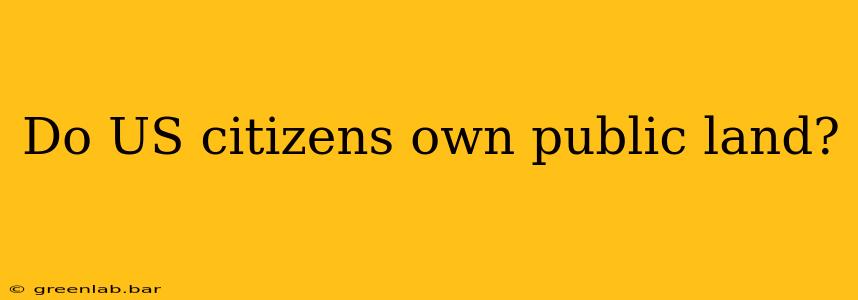The question of whether US citizens own public land is a surprisingly complex one, far exceeding a simple yes or no answer. While the land is owned by the public, the concept of "ownership" in this context requires a nuanced understanding. This article will delve into the intricacies of public land ownership in the United States, exploring its history, management, and the rights and responsibilities of citizens regarding these vast and valuable resources.
The Public Trust Doctrine: The Foundation of Public Land Ownership
The cornerstone of public land ownership in the US lies in the Public Trust Doctrine. This legal principle, dating back to Roman times and deeply embedded in American jurisprudence, asserts that certain natural resources – including navigable waters, submerged lands, and, crucially, many areas considered public lands – are held in trust by the government for the benefit of all citizens. This isn't ownership in the traditional sense of individual property rights, but rather a stewardship role for the benefit of present and future generations.
Who Owns the Land? The Federal Government's Role
The vast majority of public land in the US is owned by the federal government, managed by agencies like the Bureau of Land Management (BLM), the United States Forest Service (USFS), the National Park Service (NPS), and the Fish and Wildlife Service (FWS). These agencies are tasked with balancing diverse interests, including conservation, recreation, resource extraction, and economic development, all while upholding the public trust.
Different Agencies, Different Management Styles
It's crucial to understand that each agency approaches land management differently. The National Park Service prioritizes preservation and visitor experience, while the Bureau of Land Management manages vast tracts of land for multiple uses, including grazing, mining, and timber harvesting. This diversity in management reflects the complexity of public lands and the varied needs of the American public.
What Rights Do Citizens Have? Access and Use
While citizens don't own public land in the individual sense, they possess significant rights regarding its use and access. These rights include:
- Recreation: Hiking, camping, fishing, hunting, and other recreational activities are often permitted on public lands, subject to regulations and permits.
- Resource Extraction: In some cases, citizens (or businesses) can obtain permits for activities like mining, logging, or grazing on public lands, adhering to strict environmental regulations.
- Conservation: Citizens have the right to advocate for the protection and conservation of public lands, participating in public land management planning processes and supporting conservation organizations.
Responsibilities of Citizens Regarding Public Lands
Along with rights come responsibilities. Citizens are expected to:
- Respect regulations: Adhere to rules and regulations governing public land use to protect the environment and ensure safety.
- Practice Leave No Trace ethics: Minimize environmental impact during recreational activities, leaving public lands as pristine as possible.
- Participate in responsible stewardship: Advocate for responsible management practices and contribute to conservation efforts.
The Future of Public Land Ownership
The future of public land ownership in the United States is a subject of ongoing debate and policy discussions. Balancing competing interests – conservation versus resource extraction, preservation versus recreation – requires careful consideration and collaboration between government agencies, environmental organizations, and the American public.
Conclusion: A Shared Legacy
Public land in the US isn't about individual ownership; it's about shared responsibility. It's a legacy entrusted to present and future generations, requiring collective stewardship to ensure its preservation and sustainable use. Understanding the nuances of public land ownership is vital for active participation in shaping the future of these invaluable national resources.

